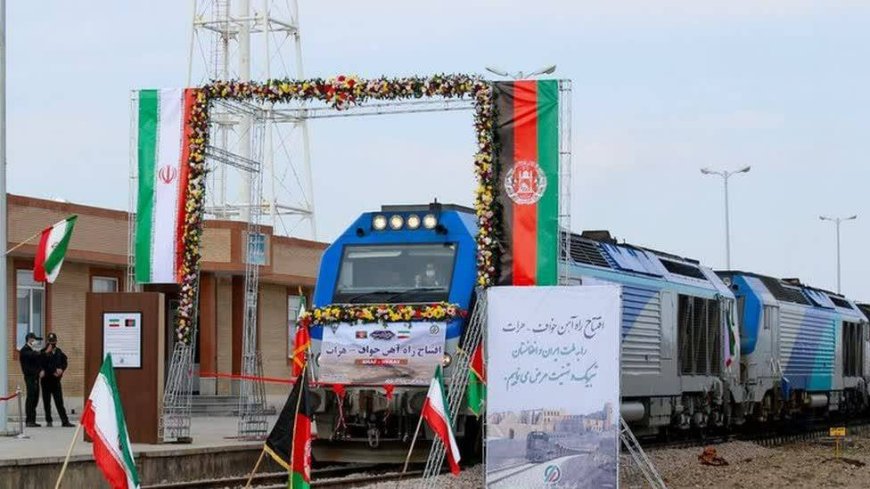The Silk Road Reborn: Afghanistan's Railway Revolution

In an era defined by the rapid pace of globalization and the increasing interconnectedness of nations, the recent inaugural journey of Afghanistan's maiden commercial train to Turkey from Roznak, Iran, stands as a testament to the power of infrastructure in shaping the future of international trade and diplomacy. This historic event, marked by the departure of a train laden with Afghan goods destined for the markets of Turkey and Europe via the Herat-Khaf rail route, represents a significant milestone in Afghanistan's journey towards economic integration and global relevance.
Afghanistan, a landlocked nation long perceived as geographically isolated, has in fact occupied a crucial position at the crossroads of civilizations for centuries. Situated on the ancient Silk Road, which once facilitated the exchange of goods, ideas, and cultures between the East and West, Afghanistan's strategic location has been a double-edged sword. While its position has historically made it a coveted prize for invading armies and a battleground for competing empires, it has also endowed the country with the potential to serve as a vital link in the global supply chain.
The Untapped Potential of Railway Infrastructure in Afghanistan
The importance of railway systems in modern transportation networks cannot be overstated. Most nations have long recognized the advantages of leveraging these efficient and cost-effective modes of transit for both domestic and international connectivity. Afghanistan, however, has lagged behind in this regard, with a limited railway network connecting it to only three of its neighbors: Uzbekistan, Turkmenistan, and Iran. Among these links, the Khaf-Herat railway stands out as a particularly significant development, as it not only enhances Afghanistan's connectivity with Iran but also provides a vital link to Turkey, opening up new avenues for trade and cooperation.
The Taliban's Vision for Economic Revitalization
The Taliban administration in Afghanistan has demonstrated a keen understanding of the transformative potential of railway infrastructure in reshaping the country's economic and geopolitical fortunes. By emphasizing the Khaf-Herat railway's ability to alleviate Afghanistan's geographical isolation and stimulate economic growth, the Taliban has signaled its commitment to leveraging the country's strategic position for the benefit of its people. This renewed focus on infrastructure development is a testament to the Taliban's recognition of the critical role that connectivity plays in fostering economic prosperity and enhancing global relevance.
The Geo-Economic Implications of the Khaf-Herat Railway
The extension of the Khaf-Herat railway to Turkey holds immense promise in terms of reducing transportation costs, streamlining border traffic, and fostering deeper political, cultural, and economic ties across the region. This railway connection not only benefits Afghanistan and Turkey but also has broader implications for regional development and connectivity. By facilitating the efficient movement of goods and people, the Khaf-Herat railway has the potential to catalyze trade and investment, creating new opportunities for economic growth and job creation in both countries.
Turkey's Strategic Vision for Regional Connectivity
Turkey has long been a proponent of regional connectivity, with initiatives like the Lazuli Road aiming to link Afghanistan, Turkmenistan, Azerbaijan, and Georgia to Europe via Turkey. The Afghanistan-Iran-Turkey railway, however, emerges as a more viable and efficient alternative to the Lazuli Road, offering a more direct route for the transit of goods and people. This development is particularly significant for Turkey, as it seeks to solidify its position as a key player in regional trade and commerce, while also enhancing its own economic prospects through increased connectivity with its neighbors.
The Revitalization of the Silk Road and Regional Cooperation
The establishment of a railway link between Afghanistan and Turkey through Iran holds immense potential for revitalizing the ancient Silk Road, a network of trade routes that once connected the East and West. By facilitating the efficient movement of goods and people across the region, this railway connection has the potential to enhance regional cooperation and foster a climate of mutual prosperity. Moreover, the increased connectivity will facilitate the exchange of ideas, cultures, and innovations, contributing to the growth and development of the region as a whole.
Conclusion
As the world continues to grapple with the challenges of globalization and the need for greater international cooperation, the railway connection between Afghanistan and Turkey via Iran stands as a shining example of the transformative power of infrastructure in shaping the future of regional and global affairs. By leveraging this vital link, Afghanistan, Turkey, and their neighbors have the opportunity to unlock vast potential for trade, development, and cultural exchange, paving the way for a more interconnected and prosperous future for all.













































